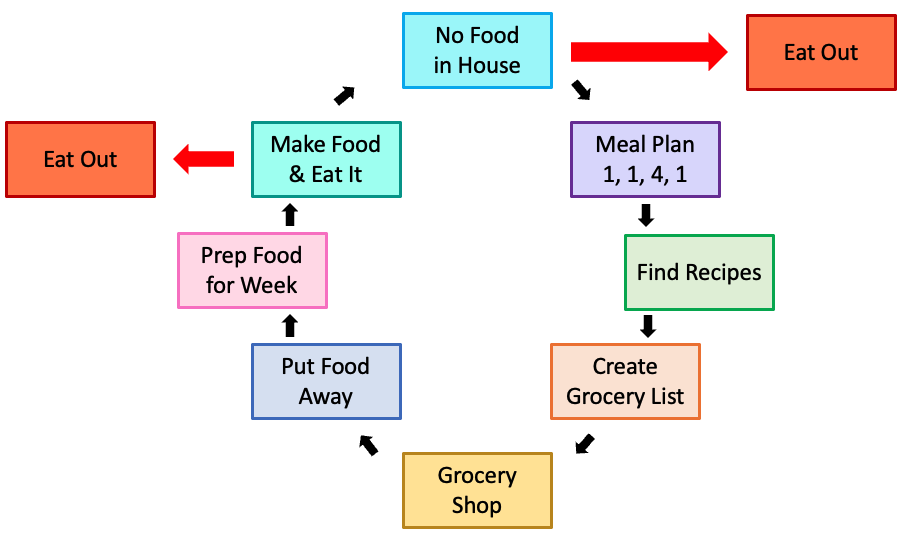The Importance of the Weekly Meal Cycle

The cornerstone of any diet, whether for weight loss or health, is the weekly meal cycle. The weekly meal cycle is a very simple concept, yet I would wager that most people don’t follow one. Most people don’t know what they are having for dinner tonight, let alone for the next week.
Trying to plan each night’s dinner the day of is madness and will either leave you eating some half-baked concoction of ingredients you have laying around, making an unexpected grocery store trip, or eating out, none of which are great options.

Figure 1. The Weekly Meal Cycle. Any disruption to the cycle will likely result in overeating (eating out) and weight gain.
- No Food in House: the weekly meal cycle starts with you not having any food in your house, or perhaps you are down to your last meal. At this point your options are to eat out or go to step 2. Eating out is a slippery slope that can lead to excess calories and turn into a multi-day event.
- Make a Meal Plan (1,1,4,1): plan out 1 breakfast, 1 lunch, 4 dinners, and 1 emergency/bridge meal for the week (I help you do this in The Science of Dieting Program). Breakfast is pretty easy, lunch is one meal and then eating leftovers, 4 new dinners and 2-3 dinner leftovers (covers 7 dinners for the week), and one easy to make emergency/bridge meal such as spaghetti if you don’t have time to make one of your other planned dinners.
- Find Recipes: to create your meal plan, find recipes to create a grocery list. I recommend storing your tried-and-true recipes in a recipe app (Paprika Recipe Manager) so that you can easily access them later.
- Create a Grocery List: good old pen and paper works, but again, I like the Paprika Recipe App. You can choose your meals for the week and create a nice, clean digital grocery list using the app.
- Go Grocery Shopping: choose a day each week to go to the grocery store. Make this your “grocery shopping day” and try to stay as consistent as humanly possible. Grocery delivery might be an option for you if you find that you’re having trouble getting to the store.
- Put Your Food Away: your fridge, fruit bowl, and pantry should be organized in a way that you can easily find and access the food/ingredients that you need. You should have a specific location in your fridge or pantry for common items: milk, eggs, meat, cereal, canned goods, etc. Everyone’s physical space is a little different but please try to develop your own system.
- Prep Food for Week: are there vegetables that can be washed and cut up ahead of time? Do you need to hard boil your eggs? You’d be amazed at how much produce is wasted (left to rot, moldy or shriveled up) because we couldn’t overcome the simple obstacle of washing and cutting them up (example: grapes and strawberries).
- Make Your Food and Eat It: make your meals over the course of the week and eat them. Sometimes it is helpful to prep ingredients ahead of time (i.e., cut up vegetables or boil and shred chicken). If you can’t make your meals as planned, try making your easier bridge/emergency meal OR have a “go to” lowish calorie meal that you can order out (i.e., a McDonalds cheeseburger and diet coke). But be extremely careful here, chances are that if you are short on time or stressed enough to not be able to make your meal as planned, you are stressed enough to go overboard once you see the McDonalds menu. You must know what you’re getting ahead of time and stick to your plan.
Getting on a weekly meal cycle doesn’t guarantee that you will reach your weight goals, whether that means losing or maintaining your weight. However, not going on a weekly meal cycle all but guarantees that you will GAIN WEIGHT in the 21st Century food environment we are all exposed to.
On a weekly meal cycle you will still need to count/track calories, modify recipes when necessary, and control your portion sizes but you will almost, by default, eat fewer calories at home than when you’re eating out.
I said it several times in this post, but it is of utmost importance that you meal plan and get to the grocery store when you are out of or nearly out of food. Diet transitions are dangerous times! Whether you are coming out of your Phase I Diet (on The Science of Dieting) getting back from a vacation or work trip, or from visiting friends and family, anything that breaks you out of the weekly meal cycle will likely cause you to overeat. Unless you have an awesome plan and crazy good discipline, you are more than likely already overeating on your trip or vacation. It is SO important for you to get back on track as soon as possible once you get back into your “real life”.
When you think about it, the weekly meal cycle seems so obvious that you’re likely to say, “duh, Todd” but like so many things in weight loss and nutrition, knowledge isn’t power, execution of that knowledge is power. Take the time today to start creating your own weekly meal cycle. It will take some upfront effort and getting used to, but it will be so worth it in the long run. As hair club for men likes to say, “I’m not only the president but I’m also a client”. I’m not going to say something hyperbolic like “IT CHANGED MY LIFE” but getting into a weekly meal cycle definitely made meal planning much less of a pain in the @ss for me. I hope it can improve your life a little bit as well.





Responses